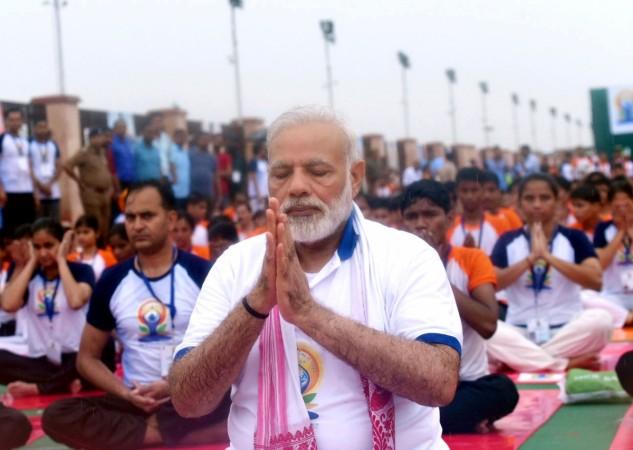
The Goods and Services Tax (GST) regime will finally kick off at midnight of June 30. This is the biggest midnight event to have occurred in India since August 15, 1947, when Jawaharlal Nehru had given his midnight 'Tryst with Destiny' speech.
The GST is undoubtedly India's biggest financial reform since the liberalisation of 1991 and although a lot of people are confused about what's in store at the moment, it is believed that it will serve for the good in the long term.
What's in store time will tell but one question which is making the observers of Indian politics curious is: Will GST be a major game changer in the country's politics?
Will GST revive memories of post-demonetisation blow?
One can draw some parallel between demonetisation of November 8, 2016, and the GST of July 1, 2017. The first had a tremendous immediate appeal when it was announced by none other than Prime Minister Narendra Modi at 8 pm on November 8 last year. The claims that it will neutralise black money business, funding of terrorists and fake currency rackets were well-received by the common people despite the sufferings that occurred because of the sudden scrapping of high denominations notes of Rs 500 and Rs 1000.
Those who survive on cash and daily wages were badly hurt but yet, the trust over Modi was not lost. Before the real picture of the GDP having received a blow came out recently, the ruling NDA made all the gains in politics because of the economic adventure called demonetisation, including winning the tough Uttar Pradesh election in March. The demonetisation had left the Opposition out of cash and hence the power to influence their vote-banks. Modi's BJP took the advantage flawlessly.
But that demonetisation was more politically beneficial than economically became evident when reports came out saying India's progress had been hit and it was no more the fastest growing economy. This is something that gave the Opposition some voice to fight back against Modi who is otherwise looking too tall for them to match at the moment.
For India's tech-savvy middle-class, demonetisation was a decent act
Demonetisation was still a decent act for India's middle-class which is tech savvy and relies on plastic money transactions more than cash. They were happy to perceive Modi as a brave leader who took the risk to target the evil-doers by turning off the cash supply in one stroke. Though it has been found later that not much has changed on the ground, the perception about Modi as a gutsy leader became stronger among the middle-class, which is the main engine of growth in India today.
![[Representational Image] note, cash, note ban, investment, mf, mutual fund, mutual funds, uti equity fund, demonetisation, rbi, atm, tax collection](https://data1.ibtimes.co.in/en/full/651636/note-cash-note-ban-investment-mf-mutual-fund-mutual-funds-uti-equity-fund-demonetisation.jpg?h=450&l=50&t=40)
But GST has every chance of enraging that class as well and that could be a worry for Modi Sarkaar. The Indian middle-class feels it is already overburdened and now if the government decides to squeeze it more through the GST, then the repercussions will be evident. Moreover, the small businessmen who have already faced a lot of hardship during demonetisation and if the GST makes them undergo the plight once again within a year, then the BJP's baniya vote-bank could go for a toss.
Demonetisation, GST have made economics electoral issue in India like never before
The twin measures of demonetisation and GST have made economics an electoral issue in India like never before. Corruption and black money have been the main issues the Indian voter has thought about while judging the country's politics from an economic point of view. The nuances of a tax regime have never been a voter's concern while casting his/her ballot.
But Modi, in the run-up to the Lok Sabha election of 2014, linked black money irrevocably with the common man's life by promising Rs 15 lakh in everybody's account after the stashed money was brought back from abroad. By appealing to people to give up subsidies in LPG connections or railway ticketing also, the government has made the middle-class become more economically thoughtful.
Besides, as India's economy gets more and more connected with the global scenario, the middle-class thinks more from the financial perspectives and the voters become more economy-literate while deciding who to favour in the next elections.
When demonetisation was announced, economics ceased to remain an exclusive domain for experts as the common man was suddenly and directly hit. In a state protected economy, it was the first time that the common man found himself as the receiving end because of an abrupt economic decision taken by the state. Since there was very little time to prepare oneself, people could only react.
People had no time to prepare for demonetisation, they will hope a better experience now
With GST, the story is different. Now, having a fresh memory in their minds, the people will be more careful and see how things affect them. And the middle-class, which is generally ruthless when it comes to spending its hard-earned money, finds it has less breathing space even for six months, the Modi government could be in for an acid test in 2019. However, the absence of a solid and effective Opposition will assure the ruling party that even if the GST backfires, it could still get away.
Like in politics, the Modi government has indulged in blitzkrieg in economics as well. So far, it has been a mixed fortune for the popular prime minister. What lies hereafter?

















